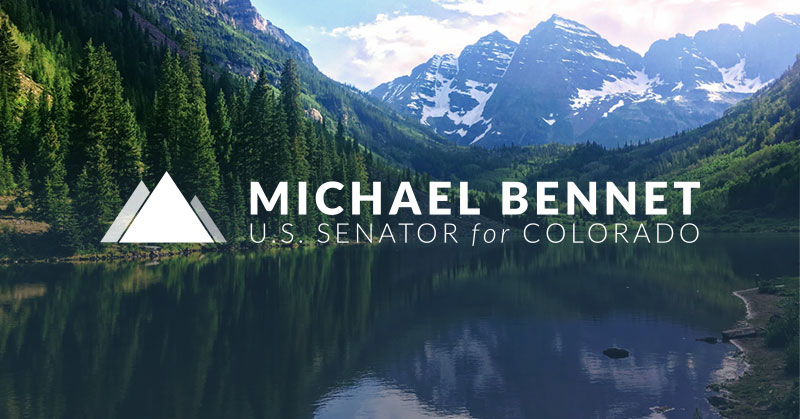Source: United States Senator for Colorado Michael Bennet
Washington, D.C. – Today, Colorado U.S. Senator Michael Bennet released the following statement after the U.S. House of Representatives passed the bipartisan Infrastructure Investment and Jobs Act (IIJA) and a rule to allow for a later vote on the Build Back Better Act:
“Today’s House vote moves us one step closer to a transformational investment in our infrastructure. For years, Washington has talked about coming together to rebuild America. This bill finally achieves it with a historic, bipartisan investment in the roads, bridges, airports, water systems, and high-speed broadband America needs to compete in the 21st century.
“But our work isn’t finished. We must also pass new investments to support kids and families, fight climate change, restore our Western forests and watersheds, and expand access to health care. At a time when many people have lost faith in Washington, we can remind Americans that our government can respond meaningfully to their urgent challenges.”
The IIJA passed with key Bennet-led initiatives, including:
- The largest ever single federal broadband investment, consistent with Bennet’s bipartisan BRIDGE Act that he introduced with U.S. Senators Angus King (I-Maine) and Rob Portman (R-Ohio) this year.
- $300 million over five years for the Emergency Watershed Protection Program (EWP) to address an estimated backlog of $200 million. Bennet has continued to push for increased EWP funding to help Colorado communities recover from wildfires, and earlier this year, Bennet and U.S. Senator Mitt Romney (R-Utah) introduced the MATCH Act to remove hurdles to securing funding through the EWP and help communities act quickly to mitigate damage while protecting their watersheds and infrastructure.
- The Carbon Capture Improvement Act, legislation Bennet and Portman introduced earlier this year, which will make it easier for power plants and industrial facilities to finance the purchase and installation of carbon capture, utilization, and storage equipment, as well as direct air capture projects through the use of tax-exempt private activity bonds.
- The Bennet-Hoeven amendment to formally authorize the United States Department of Agriculture’s Joint Chiefs’ Landscape Restoration Partnership Initiative.
- Robust funding for water infrastructure for Tribal communities, consistent with Bennet’s Tribal Access to Clean Water Act with U.S. Senators Martin Heinrich (D-N.M.), John Hickenlooper (D-Colo.), and Elizabeth Warren (D-Mass.).
- Robust funding for western water infrastructure. In June, Bennet joined his colleagues in calling on Senate leadership to prioritize funding for natural infrastructure restoration, resilience, and reclamation, including major investments in water infrastructure. Bennet and his colleagues also urged the Biden Administration to include western water priorities in their infrastructure proposal.
- $4.7 billion for programs to plug, remediate, and reclaim orphaned wells on Federal, State, and Tribal lands, consistent with provisions in Bennet’s Oil and Gas Bonding Reform and Orphaned Well Remediation Act introduced earlier this year. This will reduce methane emissions which will protect our climate, restore wildlife habitat, and create good-paying jobs.
- Bennet’s Enhancing State Energy Security Planning and Emergency Preparedness Act and the Enhancing Grid Security through Public-Private Partnerships Act, legislation Bennet introduced to protect the energy grid from cyber-attacks.
- An extension of the Secure Rural Schools program through 2023. Bennet has continued to support SRS and introduced legislation in February to reauthorize the program.
- Authorization for the Department of Transportation to return $28.9 million, plus interest, for a deposit that the Regional Transportation District made to secure a federal loan to redevelop Denver’s Union Station, which Bennet has supported.
- $3.7 billion for highway projects.
- $225 million for bridge replacement and repairs.
- $917 million to improve public transportation.
- $57 million to support the expansion of an electric vehicle charging network throughout the state.
- A minimum of $100 million to help provide broadband coverage across the state.
